当前位置:
X-MOL 学术
›
Insect Biochem. Mol. Biol.
›
论文详情
Our official English website, www.x-mol.net, welcomes your feedback! (Note: you will need to create a separate account there.)
The gut anti-complement activity of Aedes aegypti: Investigating new ways to control the major human arboviruses vector in the Americas.
Insect Biochemistry and Molecular Biology ( IF 3.8 ) Pub Date : 2020-02-29 , DOI: 10.1016/j.ibmb.2020.103338 Adalberto Alves Pereira-Filho 1 , Rafael Henrique Mateus Pereira 1 , Naylene Carvalho Sales da Silva 1 , Luccas Gabriel Ferreira Malta 1 , Artur Metzker Serravite 1 , Caio Gabriel Carvalho de Almeida 1 , Ricardo Toshio Fujiwara 2 , Daniella Castanheira Bartholomeu 2 , Rodolfo Cordeiro Giunchetti 3 , Grasielle Caldas D'Ávila Pessoa 1 , Leonardo Barbosa Koerich 1 , Marcos Horácio Pereira 1 , Ricardo Nascimento Araujo 1 , Nelder de Figueiredo Gontijo 1 , Mauricio Roberto Viana Sant'Anna 1
Insect Biochemistry and Molecular Biology ( IF 3.8 ) Pub Date : 2020-02-29 , DOI: 10.1016/j.ibmb.2020.103338 Adalberto Alves Pereira-Filho 1 , Rafael Henrique Mateus Pereira 1 , Naylene Carvalho Sales da Silva 1 , Luccas Gabriel Ferreira Malta 1 , Artur Metzker Serravite 1 , Caio Gabriel Carvalho de Almeida 1 , Ricardo Toshio Fujiwara 2 , Daniella Castanheira Bartholomeu 2 , Rodolfo Cordeiro Giunchetti 3 , Grasielle Caldas D'Ávila Pessoa 1 , Leonardo Barbosa Koerich 1 , Marcos Horácio Pereira 1 , Ricardo Nascimento Araujo 1 , Nelder de Figueiredo Gontijo 1 , Mauricio Roberto Viana Sant'Anna 1
Affiliation

|
Aedes aegypti is the main urban vector of dengue virus, chikungunya virus and Zika virus due to its great dispersal capacity and virus susceptibility. A. aegypti feed on plant-derived sugars but females need a blood meal for egg maturation. Haematophagous arthropods need to overcome host haemostasis and local immune reactions in order to take a blood meal. In this context, molecules present in the saliva and/or intestinal contents of these arthropods must contain inhibitors of the complement system (CS). CS salivary and/or intestinal inhibitors are crucial to protect gut cells of haematophagous arthropods against complement attack. The present work aimed to investigate the anti-complement activity of A. aegypti intestinal contents on the alternative, classical and lectin pathways of the human complement system. Here we show that A. aegypti gut contents inhibited the human classical and the lectin pathways but not the alternative pathway. The A. aegypti gut content has a serine protease able to specifically cleave and inactivate human C4, which is a novel mechanism for human complement inactivation in haematophagous arthropods. The gut of female A. aegypti was capable of capturing human serum factor H (a negative complement modulator), unlike males. C3 molecules in recently blood-fed female A. aegypti remain in their original state, being inactivated to iC3b soon after a blood feed. A transmission-blocking vaccine using these complement inhibitory proteins as antigens have the potential to interfere with the insect's survival, reproductive fitness and block their infection by the arboviruses they transmit to humans.
中文翻译:

埃及伊蚊的肠道抗补体活性:研究控制美洲主要人类虫媒病毒载体的新方法。
埃及伊蚊由于其强大的传播能力和易感性,是登革热病毒,基孔肯雅病毒和寨卡病毒的主要城市传播媒介。埃及伊蚊以植物来源的糖为食,但雌性需要血粉以使卵成熟。食血节肢动物需要克服宿主的止血作用和局部免疫反应,才能吃血。在这种情况下,这些节肢动物的唾液和/或肠内容物中存在的分子必须包含补体系统(CS)的抑制剂。CS唾液和/或肠道抑制剂对于保护食血节肢动物的肠道细胞免受补体攻击至关重要。目前的工作旨在调查埃及伊曲肠肠内容物对人补体系统的替代途径,经典途径和凝集素途径的抗补体活性。在这里,我们显示A。埃及肠的含量抑制了人类的经典途径和凝集素途径,但抑制了替代途径。埃及伊蚊的肠内容物具有能够特异性切割和灭活人C4的丝氨酸蛋白酶,这是在食血节肢动物中人补体失活的新机制。与男性不同,雌性埃及埃及山羊的肠能够捕获人血清因子H(负补体调节剂)。最近通过血液喂养的雌性埃及埃及伊蚊中的C3分子保持其原始状态,在采血后不久被灭活为iC3b。使用这些补体抑制蛋白作为抗原的阻断传播的疫苗有可能干扰昆虫的生存,繁殖健康并阻止它们传播给人类的虫媒病毒对其的感染。
更新日期:2020-03-02
中文翻译:

埃及伊蚊的肠道抗补体活性:研究控制美洲主要人类虫媒病毒载体的新方法。
埃及伊蚊由于其强大的传播能力和易感性,是登革热病毒,基孔肯雅病毒和寨卡病毒的主要城市传播媒介。埃及伊蚊以植物来源的糖为食,但雌性需要血粉以使卵成熟。食血节肢动物需要克服宿主的止血作用和局部免疫反应,才能吃血。在这种情况下,这些节肢动物的唾液和/或肠内容物中存在的分子必须包含补体系统(CS)的抑制剂。CS唾液和/或肠道抑制剂对于保护食血节肢动物的肠道细胞免受补体攻击至关重要。目前的工作旨在调查埃及伊曲肠肠内容物对人补体系统的替代途径,经典途径和凝集素途径的抗补体活性。在这里,我们显示A。埃及肠的含量抑制了人类的经典途径和凝集素途径,但抑制了替代途径。埃及伊蚊的肠内容物具有能够特异性切割和灭活人C4的丝氨酸蛋白酶,这是在食血节肢动物中人补体失活的新机制。与男性不同,雌性埃及埃及山羊的肠能够捕获人血清因子H(负补体调节剂)。最近通过血液喂养的雌性埃及埃及伊蚊中的C3分子保持其原始状态,在采血后不久被灭活为iC3b。使用这些补体抑制蛋白作为抗原的阻断传播的疫苗有可能干扰昆虫的生存,繁殖健康并阻止它们传播给人类的虫媒病毒对其的感染。


























 京公网安备 11010802027423号
京公网安备 11010802027423号